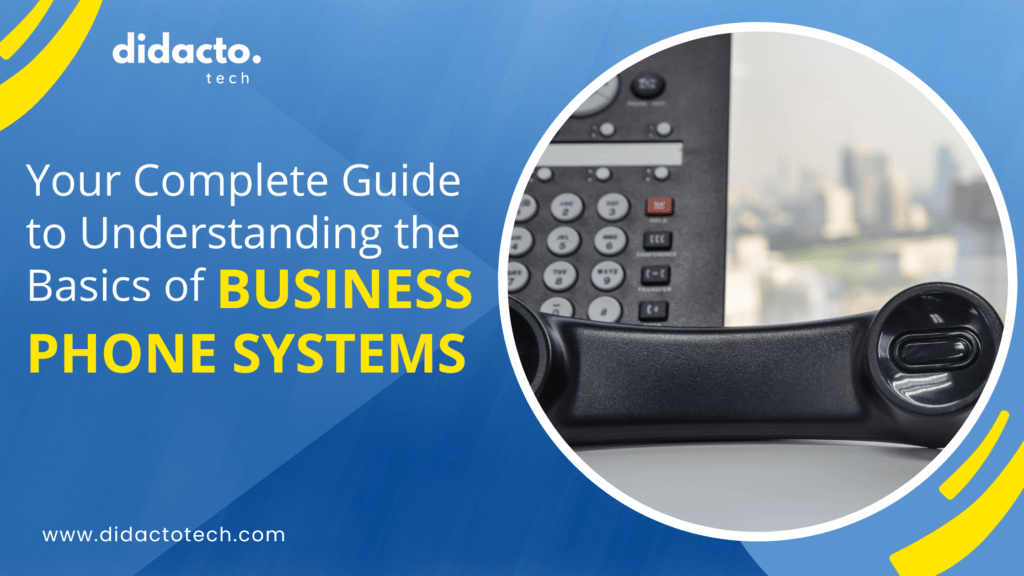Navigating the world of business phone systems can seem like a daunting task at first. However, having a reliable and efficient setup is no longer a luxury but a necessity for any company looking to thrive in today’s digital economy. This guide is designed to demystify the essentials of business phone systems, ensuring you have all the knowledge needed to make an informed decision for your business’s communication needs.
Introduction to Business Phone Systems
What is a Business Phone System?
A business phone system is more than just a single phone line; it is a complex setup that allows for multiple lines, extensions, and features that facilitate efficient communication within and outside a company. In today’s business environment, the right phone system can be a cornerstone for success, enabling smooth operations and excellent customer service.
Types of Business Phone Systems
- Traditional Landline Systems – Operated by local or regional phone companies, these are reliable but are becoming outdated due to evolving technology.
- VoIP Systems – Voice over Internet Protocol systems use internet connection to make calls, offering flexibility and a wealth of features.
- Virtual Phone Systems – These systems forward calls to personal mobiles or home phones, ideal for remote work setups.
Choosing the Right System for Your Business
When selecting a business phone system, consider the following:
- Assess your business needs, scale, and the kind of customer interactions you have.
- Understand your budget and the total cost of ownership of the system.
- Plan for the future to ensure your communication strategy remains relevant.
Features of Modern Business Phone Systems
Core Features to Look For
A solid business phone system should include key features such as:
- Call forwarding, hold, and transfer for managing calls effectively.
- Voicemail and Interactive Voice Response (IVR) systems for efficient customer service.
- Conference calling capabilities to facilitate team meetings and client calls.
Advanced Features and Integrations
To truly leverage your phone system, look for:
- Call recording and analytics for quality assurance and training.
- CRM integration to streamline customer information management.
- Cloud functionalities and mobile integration for flexibility and remote access.
Customizing Your Phone System
- Tailor features to meet your unique business requirements.
- Ensure scalability and flexibility to adapt as your business grows.
- Invest in user training and support for smooth operation.
Implementation and Maintenance of Your Phone System
Setting Up Your Chosen Phone System
- Understand installation timelines and prepare accordingly.
- Be aware of hardware and software requirements.
- Decide whether working with a provider or managing setup in-house suits your business best.
Maintaining Your System for Optimal Performance
- Regular updates and upgrades keep your system running smoothly.
- Learn how to troubleshoot common issues to reduce downtime.
- Choose between in-house and outsourced support options depending on your capabilities and budget.
Ensuring Security and Compliance
- Implement measures to protect against data breaches and fraud.
- Stay compliant with industry regulations relevant to your business and location.
- Adopt best practices for security to safeguard your information.
The Financial Implications of a Business Phone System
Initial Investment and Setup Costs
Understanding the upfront costs, including hardware, installation, and software licenses, is crucial.
Ongoing Operational Costs
Be aware of monthly service charges, maintenance fees, and potential costs related to training and downtime.
Maximizing ROI on Your Phone System
- Leverage system features for increased efficiency and better customer service.
- Make smart choices when selecting service providers to reduce costs.
- Regularly assess and optimize system usage to ensure it meets your evolving needs.
Future Trends and Innovations in Business Phone Systems
Emerging Technologies and Their Impact
- AI and automation are revolutionizing call management and customer service.
- The trend towards mobile and remote work solutions continues to grow.
- Advances in security and encryption technologies are making systems safer.
The Role of Data Analytics and Reporting
- Utilize call data for valuable business insights.
- Invest in tools that offer custom reports and real-time analytics.
- Make informed decisions to improve operations and customer satisfaction.
Preparing for Future Changes
- Keep abreast of industry trends to stay ahead of the curve.
- Choose flexible systems that can grow and evolve with your business.
- Partner with providers who are committed to innovation and excellence.
Summary
Choosing the right business phone system involves careful consideration of your current needs, potential growth, and the technological advances on the horizon. From ensuring you have the basic features required for day-to-day operations to integrating advanced functionalities for future growth, each decision plays a critical role in facilitating smooth and effective communication within your organization. Remember, the goal is not just to maintain operations but to excel, fostering a culture of efficiency, security, and reliability that propels your business forward.




